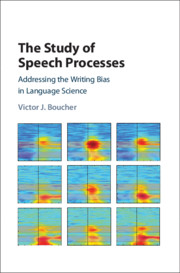Book contents
- The Study of Speech Processes
- The Study of Speech Processes
- Copyright page
- Contents
- Figures
- Tables
- Abbreviations
- Preface
- Introducing a Fundamental Problem of Language Science
- Part I Questions of Ontology: Writing and the Speech–Language Divide
- Part II Questions of Epistemology: The Role of Instrumental Observations
- 4 Recognizing the Bias
- 5 (Re-)defining the Writing Bias, and the Essential Role of Instrumental Invalidation
- Part III The Structure of Speech Acts
- Part IV The Processing of Speech Meaning
- References
- Index
5 - (Re-)defining the Writing Bias, and the Essential Role of Instrumental Invalidation
from Part II - Questions of Epistemology: The Role of Instrumental Observations
Published online by Cambridge University Press: 14 January 2021
- The Study of Speech Processes
- The Study of Speech Processes
- Copyright page
- Contents
- Figures
- Tables
- Abbreviations
- Preface
- Introducing a Fundamental Problem of Language Science
- Part I Questions of Ontology: Writing and the Speech–Language Divide
- Part II Questions of Epistemology: The Role of Instrumental Observations
- 4 Recognizing the Bias
- 5 (Re-)defining the Writing Bias, and the Essential Role of Instrumental Invalidation
- Part III The Structure of Speech Acts
- Part IV The Processing of Speech Meaning
- References
- Index
Summary
What some historians have called scriptism in language study has been defined as the tendency to view spoken language through concepts of writing. The tradition of describing spoken languages using units and categories of an orthographic code underlies repeated criticisms of the centrism of linguistic-type analyses. In reviewing these criticisms, part of the problem appears to be the persistent idea of the primacy of linguistic concepts in guiding instrumental observations. However, one finds no historical justification for this idea that has prevented a reference to empirical observations in countering a writing bias. Others see that the problem rests with the doctrine that speech is separate from language and call for the abandonment of this division. This has basic epistemological implications. It leads to acknowledgment that observable structures of speech, not letters or words, are constitutive of spoken language. How one can study language by reference to observable structures of speech is essential in addressing the writing bias, and is the subject of the second half of this book.
- Type
- Chapter
- Information
- The Study of Speech ProcessesAddressing the Writing Bias in Language Science, pp. 108 - 114Publisher: Cambridge University PressPrint publication year: 2021



